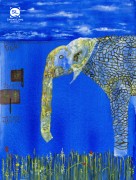I’m interested in the origins of this story, as it seems a pertinent, yet underexposed, slice of the immigrant experience. How did you decide on the characters’ POVs?
I was an assistant instructor in an ESL class during the 2016 election. It didn’t come up in discussion at the time, but something seemed to shift in the atmosphere that fall. It felt almost funereal. The classroom (which was also in a church basement) took on the feel of a bunker, like a place under siege. I was enraged by the results of the election, like many people, but I was also heartbroken viewing it through the lens of the students. It felt to me like they had been betrayed, suckered into giving up everything to pursue a life in a country that didn’t even want them. That feeling of fear and uncertainty has never left me and it’s what inspired me to write this story.
As for the POV, a first-person collective was the only one that felt right. If I focused on one narrator, from a specific country, the story instantly becomes something else. For one, I did not want to depict the unique experience of an immigrant from Ukraine or Somalia or Mexico because I cannot (and would never attempt to) capture those experiences. It needed to be universal. Because the America of today is hostile to immigrants universally.
There is little humor in the story unless we count the grim specifics of Twitter followers or the sarcasm waged by a departing Mr. Northrop. The story carries a very damning statement against opportunity in America. Why do you think it is important to tell these stories?
It’s definitely got a glass-half-empty message about where we are. It brings me no pleasure to feel that way, but I do, and I wanted to communicate that as directly and honestly as I could.
I don’t think we’re living in a time for irony. That’s a luxury for when things are going so well as a culture or a society that you almost feel an obligation to take the piss out of it. That’s not right now. Things are very bad, and it isn’t at all clear if we’re going to pull out of the skid. All we can do (if we’re writing about contemporary issues) is be sincere, empathetic, and say what we mean. The climate is too urgent to get obtuse about it.
The sense of rugged individualism that many Americans purport to be an ideal quality seems to divide this community of learners, impressing isolation and driving a wedge between instructor and class. Do you think this lapse in community was a failure on the teacher to reach the class?
I don’t believe it was Mr. Northrop’s failure, or any one individual’s. Failing at community is who we are. It’s sad, but it’s a very American thing to give up on the collective. So the dissolution of their group is what makes them part of this country, in the end. Because you’re right about our sense of individualism. As far as I know, we’re the only culture in the world that considers that a virtue, instead of the defect that it almost certainly is.
The specter of Ayaan certainly haunts the decisions of the class long after he has disappeared to fight. The place seems to change for the experience of the learners. Still, I’m curious, what is on the handout for the learners on their last day?
No doubt something asking them to write about their pasts, where they came from, in English. Something well intentioned, but oblivious.



 The core workshop of SmokeLong Fitness is all in writing, so you can take part from anywhere at anytime. We are excited about creating a supportive, consistent and structured environment for flash writers to work on their craft in a community. We are thrilled and proud to say that our workshop participants have won, placed, or been listed in every major flash competition. Community works.
The core workshop of SmokeLong Fitness is all in writing, so you can take part from anywhere at anytime. We are excited about creating a supportive, consistent and structured environment for flash writers to work on their craft in a community. We are thrilled and proud to say that our workshop participants have won, placed, or been listed in every major flash competition. Community works.